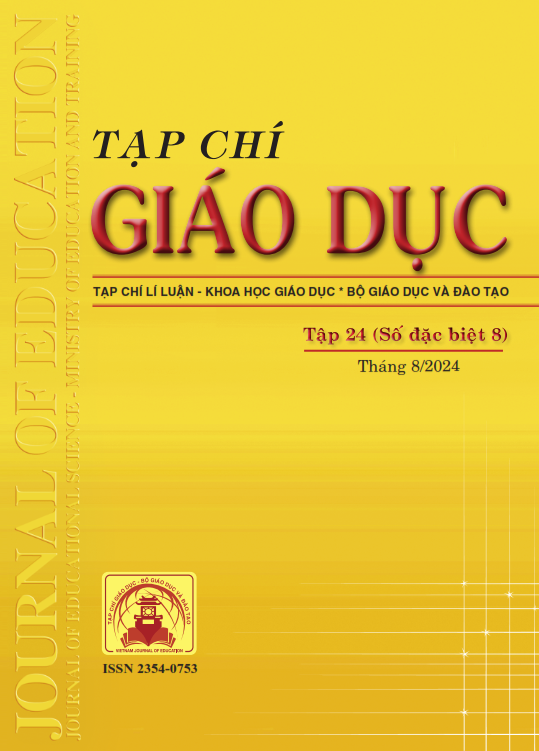Yếu tố môi trường theo tiếp cận Reggio Emilia trong giáo dục mầm non và một số khuyến nghị
Tóm tắt
Reggio Emilia is an advanced educational approach developed in Italy, valuing children's natural development through a diverse, aesthetically pleasing learning environment that stimulates curiosity and creativity of children, while also reflecting the culture and values of the community in which they live. Education following the Reggio Emilia approach addresses the important role of the physical environment in supporting the learning and development of preschool children. The article introduces environmental factors in preschools according to the Reggio Emilia approach, analyzes similarities with the goals and tasks of preschool education in Vietnam and gives some recommendations for implementation. Building an educational environment according to the Reggio Emilia approach in preschool educational establishments. Applying the Reggio Emilia approach is not only about building a positive and friendly learning environment but also a process of changing the way of viewing and evaluating the role of children in education.
Tài liệu tham khảo
Bộ GD-ĐT (2018). Thông tư số 19/2018/TT-BGDĐT ngày 22/8/2018 ban hành quy định về kiểm định chất lượng giáo dục và công nhận đạt chuẩn quốc gia đối với trường mầm non. Bộ GD-ĐT (2021). Chương trình giáo dục mầm non (ban hành kèm theo Thông tư số 01/VBHN-BGDĐT ngày 13/4/2021 của Bộ trưởng Bộ GD-ĐT).
Boyakova, E. V., Savenkova, L. B., & Torshilova, E. M. (2020). The Quality of Aesthetic Development in The Context of An Art Festival as A Condition for The Overall Development of Children and Adolescents. Propósitos y Representaciones, 8 (SPE2), e678. http://doi.org/10.20511/pyr2020.v8nSPE2.678
Cadwell, L. B. (2018). Phương pháp giáo dục Reggio Emilia (An Vi dịch). NXB Lao động. Chính phủ (2020). Nghị định số 105/2020/NĐ-CP ngày 08/9/2020 quy định chính sách phát triển giáo dục mầm non. Curtis, D., & Carter, M. (2008). Learning together with children Children: A curriculum framework for thinking teachers. Redleaf Publishing House.
Dewey, J. (1938). Dân chủ và giáo dục (Phạm Anh Tuấn dịch, 2008). NXB Tri thức.
Edwards, C., Gandini, L., & Forman, G. (2012). The hundred languages of children - The Reggio Emilia approach - Advanced reflections. Greenwood Publishing Group. Fraser, S. (2011). Authentic Childhood: Experiencing Reggio Emilia in the Classroom. Third edition. Publisher: Nelson Education. Gandini, L. (2009). Introduction to the fundamental values of the education of young children in Reggio Emilia. In Gandini, L., Etheredge, S., & Hill, L. (Eds.). Insights and inspirations: Stories of teachers and children from North America. Publisher Davis. Hoàng Phê (chủ biên, 2003). Từ điển tiếng Việt. NXB Đà Nẵng. Kang, J. (2007). How Many Languages Can Reggio Children Speak?: Many More than a Hundred! Gifted Child Today, 30(3), 45-48; 65. https://doi.org/10.4219/gct-2007-39 Ludlow, S. (2009). Maximising the potential of the ‘third teacher’ Indoor developmental play environments: 3-8 years. Teaching & Professional Practice, 3(1), 22-25.
Nguyễn Thị Thành (2022). Giới thiệu hướng tiếp cận Reggio Emilia và ứng dụng trong bối cảnh đổi mới giáo dục mầm non tại Việt Nam. Tạp chí Giáo dục, 22(6), 20-25.
Quốc hội (2019). Luật Giáo dục. Luật số 43/2019/QH14, ban hành ngày 14/6/2019. Quốc hội (2020). Luật Bảo vệ môi trường. Luật số 72/2020/QH14, ban hành ngày 17/11/2020. Thủ tướng Chính phủ (2018). Quyết định số 1677/QĐ-TTg ngày 03/12/2018 phê duyệt Đề án phát triển giáo dục mầm non giai đoạn 2018-2025. Thủ tướng Chính phủ (2019). Quyết định số 33/QĐ-TTg ngày 08/01/2019 phê duyệt Đề án Đào tạo, bồi dưỡng nhà giáo và cán bộ quản lí giáo dục mầm non giai đoạn 2018-2025.
Trịnh Thị Xim (2021). Một số vấn đề liên quan đến quan điểm xây dựng chương trình giáo dục mầm non Ý (Italia) và đề xuất quan điểm xây dựng chương trình giáo dục mầm non Việt Nam sau 2020. Kỉ yếu hội thảo “Đề xuất quan điểm xây dựng chương trình giáo dục mầm non sau 2020”. Bộ GD-ĐT, tr 75-87.
Trịnh Thị Xim, Claudia Giudici, Paola Cagliari, Nguyễn Thị Thành (chủ biên), Nguyễn Thị Mỹ Hạnh, Phạm Thị Tuyết (2021). Giáo trình: Tiếp cận Reggio Emilia trong giáo dục mầm non. Bộ GD-ĐT.
Wurm, J. P. (2005). Working in the Reggio Emilia way. Publisher Redleaf Press.
Đã Xuất bản
Cách trích dẫn
Số
Chuyên mục
Giấy phép

Tác phẩm này được cấp phép theo Ghi nhận tác giả của Creative Commons Giấy phép quốc tế 4.0 .












